
Henry Harley "Hap" Arnold was an American general officer holding the ranks of General of the Army and later, General of the Air Force. Arnold was an aviation pioneer, Chief of the Air Corps (1938–1941), commanding general of the United States Army Air Forces, the only United States Air Force general to hold five-star rank, and the only officer to hold a five-star rank in two different U.S. military services. Arnold was also the founder of Project RAND, which evolved into one of the world's largest non-profit global policy think tanks, the RAND Corporation, and was one of the founders of Pan American World Airways.

Ormer Leslie "Lock" Locklear was an American daredevil stunt pilot and film actor.

The Aeronautical Division, Signal Corps (1907–1914) was the first heavier-than-air military aviation organization in history and the progenitor of the United States Air Force. A component of the U.S. Army Signal Corps, the Aeronautical Division procured the first powered military aircraft in 1909, created schools to train its aviators, and initiated a rating system for pilot qualifications. It organized and deployed the first permanent American aviation unit, the 1st Aero Squadron, in 1913. The Aeronautical Division trained 51 officers and 2 enlisted men as pilots, and incurred 13 fatalities in air crashes. During this period, the Aeronautical Division had 29 factory-built aircraft in its inventory, built a 30th from spare parts, and leased a civilian airplane for a short period in 1911.
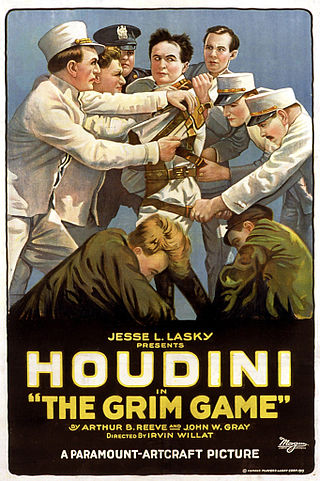
The Grim Game is a 1919 American silent drama film directed by Irvin Willat and starring Harry Houdini and Ann Forrest. The basic plotline serves as a showcase for Houdini's talent as an escapologist, stunt performer and aviator. As the story unfolds, a series of Houdini's trademark set-piece stunts and escapes are performed. When his tormentors chain him up and imprison him on numerous occasions, Houdini escapes. The film concludes with a climactic mid-air collision following an aircraft pursuit. Following the collision, Houdini is reunited with his fiancée.

Gallant Journey is a 1946 American historical film written, produced and directed by William A. Wellman and starring Glenn Ford, Janet Blair and Charles Ruggles. The film is a biopic of the early U.S. aviation pioneer John Joseph Montgomery. Gallant Journey depicts his efforts to build and fly gliders, from his childhood through to his death in 1911. The chief stunt pilot for the film was Paul Mantz. It was produced and distributed by Columbia Pictures. It is also known by the alternative title The Great Highway.
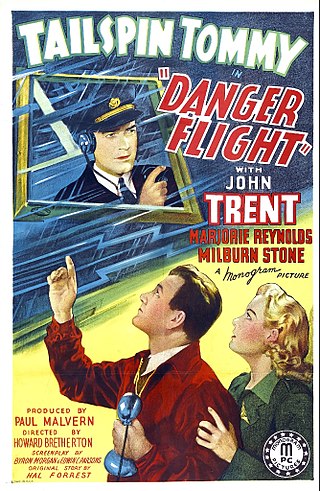
Danger Flight is a 1939 American film directed by Howard Bretherton and starring John Trent as Tailspin Tommy Tompkins, Marjorie Reynolds, Milburn Stone and Jason Robards Sr. The film featured young aviation enthusiasts in a model club.
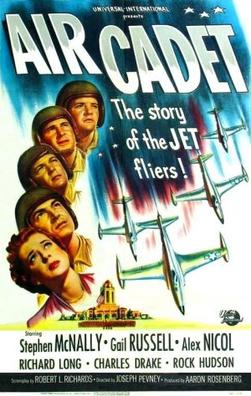
Air Cadet is a 1951 American drama war film directed by Joseph Pevney and starring Stephen McNally, Gail Russell, Alex Nicol and Richard Long. Air Cadet featured United States Air Force (USAF) pilots in training along with actors mixed into the training courses. The film had a small early role for 26-year-old Rock Hudson and a scene with future astronaut Gus Grissom.
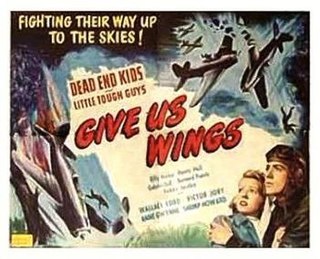
Give Us Wings is a 1940 Universal comedic film starring the Dead End Kids and the Little Tough Guys. Several members of the casts of those series were also featured in "The East Side Kids" films.
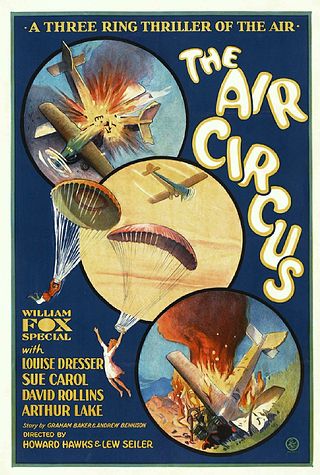
The Air Circus is a 1928 American sound part-talkie drama film directed by Howard Hawks and starring Arthur Lake, Sue Carol, David Rollins, and Louise Dresser. It is the first of Hawks's aviation films. The film is notable as the first aviation oriented film with dialogue.
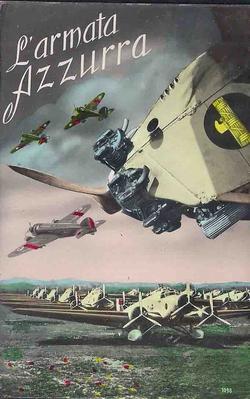
L'Armata Azzurra is a 1932 Italian aviation docu-drama and adventure film directed by Gennaro Righelli and starring Germana Paolieri and Ennio Cerlesi. It was Italy's first aviation drama film, with a fictional story that celebrated the Italian Air Force.

Battle Taxi is a 1955 American aviation drama film directed by Herbert L. Strock and written by Malvin Wald. The film stars Sterling Hayden, Arthur Franz, Marshall Thompson, Leo Needham and Jay Barney. The film was released on January 26, 1955 by United Artists.

The Flying Fool is a 1929 aviation-themed film produced and distributed by Pathé Exchange as both a silent film and sound film just as Hollywood was transitioning to filming with sound. Tay Garnett directed and William Boyd, Russell Gleason and Marie Prevost starred.

Captain Swagger is a 1928 American synchronized sound crime drama film directed by Edward H. Griffith and stars Rod La Rocque. While the film has no audible dialog, it was released with a synchronized musical score with sound effects utilizing the RCA Photophone sound-on-film sound system. The film was released with both the sound-on-disc and sound-on-film formats. The film was produced and distributed by the Pathé Exchange company.
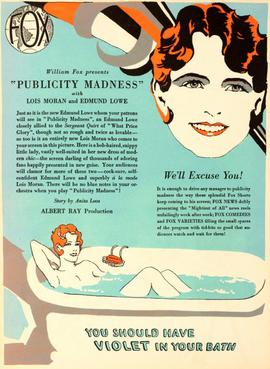
Publicity Madness is a lost 1927 American comedy film directed by Albert Ray and written by Andrew Bennison and Malcolm Stuart Boylan. The film stars Lois Moran, Edmund Lowe, E. J. Ratcliffe, James Gordon, Arthur Housman and Byron Munson. The film was released on October 2, 1927, by Fox Film Corporation, in a rush to capitalize on the publicity surrounding transatlantic flight of Charles Lindbergh.

Flying Romeos is a 1928 American comedy adventure directed by Mervyn LeRoy and written by John McDermott, Sidney Lazarus, Gene Towne and John W. Conway. The film stars the comedy team of Charles Murray and George Sidney, stars of Universal's popular "The Cohens and Kellys" comedies, moonlighting at First National Pictures. Other sidekicks included Fritzi Ridgeway, Lester Bernard, Duke Martin, James Bradbury Jr. and Belle Mitchell. Flying Romeos was released on February 26, 1928, by First National Pictures, typically a B movie studio.
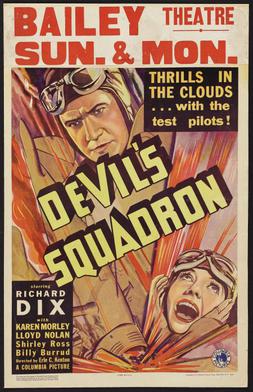
Devil's Squadron is a 1936 American drama film directed by Erle C. Kenton and starring Richard Dix, Karen Morley and Lloyd Nolan. The following written prologue appears after the opening credits: "This picture is dedicated to the test pilots....those men who knowingly face death every time they leave the ground in an untried airplane. We never hear of these men, yet on their courage depends the future of aviation."

The Air Patrol is a 1928 American silent drama film directed by Bruce M. Mitchell and written by William Berke and Gardner Bradford from a story by Al Wilson, the film's star. The film stars Al Wilson, Elsa Benham, Jack Mower, Frank Tomick, Monte Montague, and Taylor N. Duncan. The film was released on January 1, 1928, by Universal Pictures. The Air Patrol was one of a series of films that showcased the exploits of the stunt pilots in Hollywood.

The Sky Skidder is a 1929 American silent action film directed by Bruce M. Mitchell and written by Carl Krusada and Gardner Bradford. The film stars Al Wilson, Helen Foster, Wilbur McGaugh, and Gilbert Holmes. The film was released on January 13, 1929, by Universal Pictures.

Three Miles Up is a 1927 American silent action film directed by Bruce M. Mitchell. The film stars Al Wilson, William Malan and Ethlyne Clair. Three Miles Up was one of a series of films that showcased the exploits of the stunt pilots in Hollywood.

Sky High Saunders is a 1927 American silent action film directed by Bruce M. Mitchell. The film stars Al Wilson, Elsie Tarron and Frank Rice. Sky High Saunders was one of a series of films that showcased the exploits of the stunt pilots in Hollywood.




















